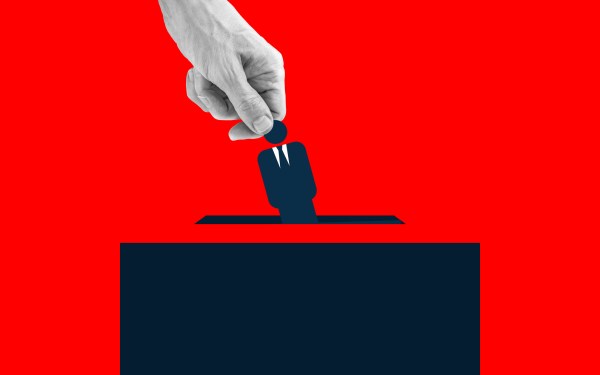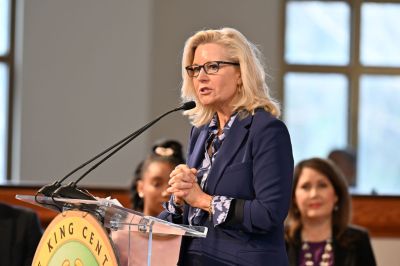Of all the living Republicans who have run on a presidential ticket, only two are publicly backing Donald Trump: Sarah Palin, the 2008 vice presidential candidate, and J.D. Vance, Trump’s current running mate.
Everyone else is going a different way.
Trump’s two-time running mate and vice president, Mike Pence, is declining to support the man who still defends the mobs that wanted him hanged for following the Constitution.
George W. Bush, the twice-elected Republican president, has said he won’t be endorsing anyone. Former Vice President Dan Quayle has stayed mum, and his silence speaks for itself. Mitt Romney, Trump’s immediate predecessor as the GOP presidential nominee, and his running mate, former House Speaker Paul Ryan, have said they won’t vote for Trump.
And Dick Cheney, the former two-term vice president, White House chief of staff, secretary of defense and congressman, said last week that he will vote for the Democratic nominee, Kamala Harris.
Cheney joined his daughter, Liz Cheney, a onetime rising star among House Republicans, in endorsing Harris.
I have nothing but respect for all these decisions. (I will never vote for Trump.) But Liz Cheney’s path has arguably been the most heroic insofar as she risked—and lost—the most.
If the former congresswoman had opted to back Trump—or just backtrack on her condemnations of him after a “respectable” period of time the way former Speaker Kevin McCarthy and so many others did—she might be the speaker today. But she stuck to her convictions, demanding that Trump be held accountable for his disqualifying behavior on and around January 6, 2021. And her political career is therefore over—or at least it is so long as the GOP remains in thrall to Trump.
That might change one day. But even if the GOP wakes from the spell of Trumpism, it would take a lot of twists and turns for her profile in courage to end with her being plucked from the wilderness to lead the party like a Churchill or de Gaulle.
Yet I don’t think her approach is ideal strategically. And strategy is, by Cheney’s own account, what matters here. She has repeatedly said that she would “do everything I can” to make sure Trump doesn’t return to the White House.
Again, I have no principled objection to that agenda. But I do have misgivings about her approach, particularly her claims that Harris is essentially a centrist whom conservatives should feel comfortable supporting.
“I think that she [Harris] has changed in a number of very important ways on issues that matter,” Cheney told ABC News’ This Week on Sunday. “And I … would encourage independents to look at where she is on these policy issues today.”
I think Cheney should acknowledge the discomfort that comes with supporting Harris. The universe of undecided and persuadable voters in the relevant swing states is small. Those who have been swayed by Cheney’s well-known arguments about Trump’s unfitness for office have probably already been swayed. How many voters might yet be persuaded by her formal endorsement of Harris? Dozens? Hundreds? Maybe.
Meanwhile, as asinine as I find the argument, many Republicans and conservatives have been convinced that Liz and Dick Cheney are “RINOs”—the childish acronym for “Republican in name only” closet liberals. Arkansas Gov. Sarah Huckabee Sanders, an indefatigable Trump loyalist, said on This Week that Liz Cheney is “a non-factor. I’m not trying to be rude, but you don't get to call yourself a conservative or Republican when you support the most radical nominee that the Democrats have ever put up.”
Whatever you think of that talking point—or Sanders’ authority to decide who is or isn’t a conservative—it’s effective with a lot of people in part because there is some truth to it. Harris’ record, particularly prior to the last six weeks, has been irrefutably left-wing.
Why not acknowledge that? If Cheney and other anti-Trump conservatives are going to face the charge that they’re just born-again left-wingers, why don’t they criticize Harris’ progressive politics while saying they’re going to vote for her anyway because supporting Trump isn’t an option?
Asking conservatives who dislike Trump—and there are millions—to simultaneously defenestrate their party’s nominee, their party and their principles is too much. What they seek is permission to make the best of a bad situation while still being able to identify as conservative and Republican.
Cheney recently endorsed Democratic Texas Rep. Colin Allred in his bid to defeat Sen. Ted Cruz. She has her reasons, including Cruz’s defense of Trump’s scheme to steal the 2020 election. But giving conservatives and Republicans another reason to think she’s not one of them anymore undermines her efforts to persuade them that the former president is such a unique threat that they should vote for a liberal Democrat for president.
It’s unlikely that anyone inclined to vote for Harris will be moved to vote for Trump because Liz Cheney says Harris is dismayingly left-wing but still the lesser evil. But many conservatives might be persuaded by the honesty of the argument that saving the GOP, conservatism and the country warrants voting for a Democrat—and then concentrating on rebuilding the Republican Party and the conservative movement after Election Day.






Please note that we at The Dispatch hold ourselves, our work, and our commenters to a higher standard than other places on the internet. We welcome comments that foster genuine debate or discussion—including comments critical of us or our work—but responses that include ad hominem attacks on fellow Dispatch members or are intended to stoke fear and anger may be moderated.
With your membership, you only have the ability to comment on The Morning Dispatch articles. Consider upgrading to join the conversation everywhere.